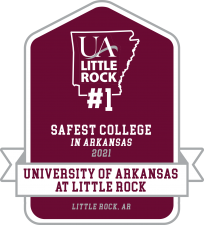UA Little Rock is committed to a drug-free environment and to the elimination of drug abuse on campus and beyond. When people abuse alcohol and other drugs, academic performance, health, personal relationships, and safety suffer.
The university provides a drug prevention program accessible to students and employees that includes strategies to change inappropriate community norms regarding alcohol and other drug use, to alter environmental factors that support inappropriate use, and to provide information and skills to help individuals make healthy decisions regarding alcohol and other drug use.
UA Little Rock complies with the standards set forth by the Drug Free workplace Act 1988 and the Drug-Free Schools and Communities Act Amendments of 1989 and expects students and employees to obey applicable local, state, and federal laws and to adhere to the behavioral standards and standards of conduct regarding the use and abuse of alcohol and other drugs on university premises.
Learn more about:
Standards of Conduct and University Sanctions
- Any student, employee or student/facility group giving or in any way transferring controlled substances to another person or selling or manufacturing a controlled substance while attending classes as a student and/or while on the job, on university premises or related premises will be subject to discipline up to and including termination, suspension, and/or referral to the authorities for prosecution.
- The university expects students, employees, and groups to be free of controlled substances and to refrain from use of controlled substances on university premises or related premises or at a university activity. Violation of this policy will result in discipline up to and including suspension or termination.
- Students, employees, and groups whose behavior and/or conduct is a result of alcohol or other drug misuse/abuse on university premises or a part of any university activity may be required to undergo a pre-assessment (screening) at the Counseling Services or Health Services and/or clinical assessment at an appropriate agency identified by the university.
- The student or employee will be responsible for the cost of a clinical assessment.
- The welfare of the student or employee comes first, and the discipline may be deferred until later and/or dismissed depending upon the severity of the violation.
- Any containers of beer, wine, or distilled spirits that are being transported in a private automobile must be sealed and covered while on university premises.
- The university does not condone the possession, consumption, ingestion, injection, or inhalation (without prescription or medical authorization) of drugs that have the capacity to change a person’s mood, behavior, or mind/body, or modify and relieve pain, such as, but not limited to, opiates, amphetamines, barbiturates, hallucinogens, psychedelics, or solvents. Any student, employee, or group found to be in violation of federal, state, and local narcotic or controlled substance laws on university premises will be subject to discipline up to and including suspension or termination.
- Students and employees under the age of 21 shall not drink, dispense or be under the influence of alcohol or possess alcoholic beverages on university premises or at functions or activities controlled by the university. However, persons of legal age, as prescribed by state law (twenty-one years and over) may possess and consume these beverages in the privacy of assigned rooms in university apartments, houses or the residence hall. Violation of this policy will result in discipline up to and including suspension or termination.
- Student organizations are prohibited from spending student activity fee money to purchase alcoholic beverages.
More detailed information regarding alcohol and other substance abuse policies is found in the Student Handbook, the Faculty Handbook, and the Classified Employee Handbook under Disciplinary Policy.
Sanctions
Unlawful possession, use, manufacture, or distribution of alcohol or illicit drugs by faculty, staff, or students on university property or as a part of any university activity may lead to sanctions within the university, the severity of which shall increase as the seriousness of the violation increases. Sanctions can include:
- A verbal or written reprimand
- Completion of an appropriate rehabilitation program
- A disciplinary warning or disciplinary probation with notice that repetition of the offense or continuation of the offense may result in a more serious sanction
- Suspension from the university (student) or from employment (employee) or from a specific university activity or facility for a fixed period of time or until completion of specified conditions, such as completion or an appropriate rehabilitation program
- Expulsion from the university (student) or termination of employment (faculty and staff and/ or other appropriate sanctions.
On/Off-campus Violations
Actions on or off-campus that violate university behavioral standards, the Code of Student Conduct, or federal, state, and local laws may subject any student, employee or student/employee group to concurrent jurisdiction of, and the imposition of a sanction by, both the university and civil authorities.
The university may enforce its own regulations against a student, employee or student/employee group that violates the code, regardless of any proceedings instituted by other authorities.
The university may proceed with campus disciplinary action hearings without waiting for results of off-campus criminal proceedings for acts that occurred on campus without fear of violating student, employee or student/ employee group constitutional rights.
Violations may be dealt with in one of the following ways:
- The student, employee, or student/employee group may, in the case of minor violations and infractions, be subjected only to censures imposed by the university authority.
- The student, employee, or student/employee group may be subjected to censures imposed by the civil authority and subjected only to the censures imposed by that authority.
- The student, employee or student/employee group may be subjected to censure imposed by the civil authority and by university authority.
